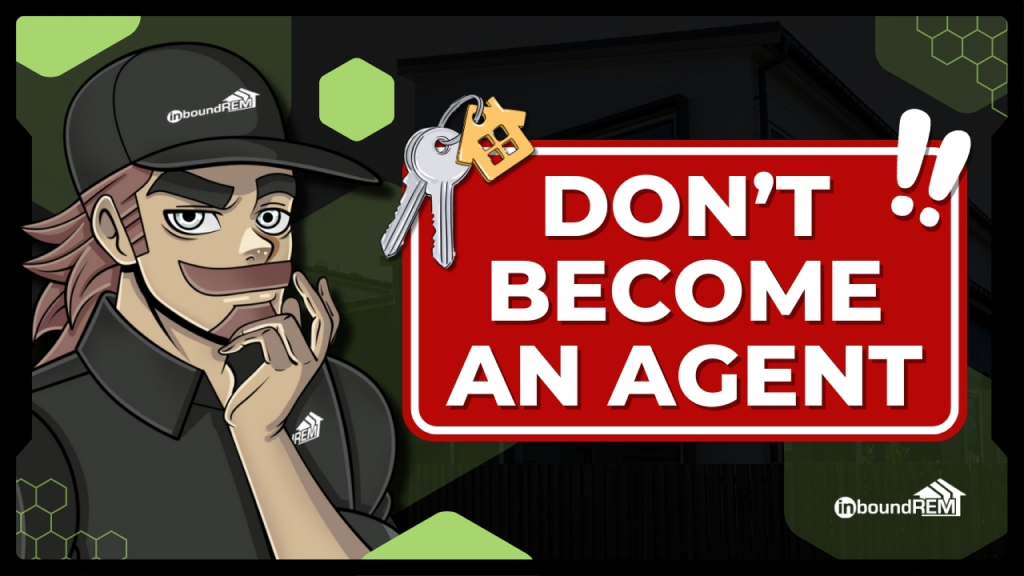Becoming a real estate agent might seem like a dream job. Flexible hours, big commission checks, and the chance to show beautiful homes—what’s not to love?
But before you jump in, it’s important to understand that real estate is not as easy as it looks. In fact, about 87% of new agents fail within the first five years.
Why? Because the reality of this career is a lot tougher than most people expect.
If you’re thinking about getting your real estate license, it’s crucial to know what you’re getting into. This isn’t just about liking nice homes or wanting a career change—it’s about whether you’re truly ready for the challenges that come with it.
The following sections will cover key reasons why becoming a real estate agent may not be the right move for you.
By the end, you’ll have a clearer idea of whether this career path is worth pursuing or if you should consider other options.
1. You’re Not Ready to Run Your Own Business
Being a real estate agent is like running your own mini-business. You’re responsible for everything—finding clients, marketing your services, managing your finances, and, importantly, building a network of business relationships.
If you’re not ready to juggle all these responsibilities and manage the connections necessary for success, real estate might not be for you.
Actionable Insights
1. You’re not just selling homes, you’re running a business
This is one of the biggest oversights people make before becoming a real estate agent. They don’t realize that you’re still running a small business even if you join an agency with strong support.
Real estate isn’t just about showing properties. You’re responsible for creating a personal brand, marketing yourself, generating leads, and keeping clients happy.
On top of that, you’ll need to establish a network of trusted professionals who can help you and your clients throughout the buying or selling process.
From lenders and tax experts to home inspectors and appraisers, these relationships are key to running a smooth business.
- Self-check: Are you ready to build and maintain relationships with mortgage lenders, appraisers, tax professionals, home inspectors, and more? Do you have the organizational and multi-faceted skill set to run a successful small business?
You’ll also want to connect with potential referral sources like divorce attorneys, estate planners, and financial advisors who can send you clients.
If you’re not comfortable networking and maintaining these connections, you might find it hard to succeed in real estate.
2. Building your professional network is essential
A successful real estate agent needs to constantly expand their network. This means not only finding new clients but also developing relationships with professionals who can support your business.
Building strong ties with divorce lawyers, financial planners, local business owners, and other experts can lead to valuable referrals.
- Self-check: Do you have the confidence and initiative to reach out and create mutually beneficial relationships with professionals in other industries?
If networking doesn’t come naturally or feels intimidating, it could be a major hurdle in your real estate career.
3. You’re responsible for managing multiple moving parts
You’re your own boss, which means you need to stay organized and manage a ton of moving parts.
This includes handling finances, marketing, client follow-ups, and business relationships—all at once.
Juggling all these aspects requires a solid strategy and strong organizational skills. It’s possible to hire a professional assistant to help, but this comes with additional cost. Plus there’s the additional responsibility of managing someone.
- Self-check: Are you able to multitask and keep various parts of your business running smoothly?
If staying organized and balancing different roles isn’t your strong suit, the chaos of managing your own real estate business could quickly become overwhelming.
4. Financial management and budgeting are on you
Real estate agents deal with irregular income.
That means managing your business expenses—like marketing, gas, client lunches, and fees—while also handling personal finances. Without a steady paycheck, budgeting is critical.
- Self-check: Can you manage your income fluctuations and still invest in growing your business?
If handling all your irregular personal and business finances sounds stressful, real estate may not be the right path.
2.You Don’t Have a Financial Cushion
Real estate requires significant upfront investment, and you may not earn income for months after starting.
Licensing fees, marketing expenses, association dues, and daily business costs all add up quickly.
Without a financial cushion, many new agents struggle and are forced to quit before they’ve had a chance to gain traction.
Actionable Insights
1. Save at least six months of living expenses
It’s essential to have a financial cushion that covers both your business and personal expenses for at least six months.
This will give you the time to build your client base without the stress of immediate financial pressure.
- Tip: Build a savings plan before transitioning into real estate. Calculate your current monthly expenses, then add additional funds to cover business costs like marketing, transportation, and continuing education.
2. Budget for business expenses
Real estate comes with several recurring expenses, such as licensing fees, MLS dues, and marketing costs. Without budgeting, these expenses can quickly pile up and put strain on your finances.
- Tip: Use a budget to track your business expenses and ensure you aren’t overspending. Here’s an estimate of common expenses over a six-month period:
Expense Category | Estimated Monthly Cost | Estimated 6-Month Total |
|---|---|---|
Total Business Expenses | $4,160 – $7,220 | |
Licensing and Exam Fees | $200 (one-time) | $200 (one-time) |
MLS and Association Fees | $60 – $120 | $360 – $720 |
Marketing and Advertising | $300 – $500 | $1,800 – $3,000 |
Gas and Transportation | $150 – $250 | $900 – $1,500 |
Continuing Education | $50 – $100 | $300 – $600 |
Lead Generation Tools | $100 – $200 | $600 – $1,200 |
3. Leverage free lead generation strategies
Free lead generation methods can be a lifeline for new agents who need to reduce their upfront costs while still building a solid client base. These methods allow you to grow your network without spending money on paid advertising.
- Tip: Start with free strategies like organic social media posts, networking, and reaching out to your existing contacts.
Use 14 Best Strategies for Free, Quality Real Estate Leads to explore methods that don’t require heavy investment but still yield results.
3. You Don’t Like Constant Communication
If the idea of constantly being on the phone, texting, or emailing sounds exhausting, real estate might be a tough fit.
This industry thrives on communication—whether you’re following up with leads, negotiating deals, or keeping your clients in the loop, being responsive is essential.
If you’re not someone who likes to stay connected regularly and outside typical business hours, you’ll find it hard to build relationships and close deals.
Actionable Insights
1. Sharpen your communication skills
Real estate isn’t just about knowing the market; it’s also about how well you communicate with people. You’ve got to be clear, straightforward, and a good listener.
Whether you’re explaining the buying process or giving updates on a deal, clients appreciate when you can break things down simply.
- Tip: Watch YouTube videos on active listening, effective communication, and reading body language. There’s plenty of free content that can teach you how to connect better with clients in a natural way.
2. Use systems to stay on top of responses
Quick responses can make or break deals. Clients don’t like waiting, especially when there’s a lot at stake. If you’re not the best at replying quickly, setting up some tools to help you manage communication can be a game changer.
- Tip: Try using a CRM like Follow Up Boss to handle client follow-ups and keep track of conversations. You can also create email templates for frequently asked questions, so you’re not typing the same thing over and over.
4. You Don’t Have a Strong Work Ethic
Real estate might seem like a dream job, but the reality is that it’s a grind. It’s not your typical 9-to-5, and if you’re not prepared to hustle, especially outside normal working hours, you’re going to struggle.
Clients expect you to be available when they’re free—which often means nights, weekends, and sometimes on short notice.
If you have a lifestyle that doesn’t allow for this flexibility, like being a single parent with young kids, you might find it really tough to keep up.
Actionable Insights
1. Understand the demands of a non-9-to-5 schedule
Real estate requires flexibility. You’ll need to meet clients on their schedule, not yours, and that could mean showing homes after dinner or early on a Saturday morning.
If your personal life makes it hard to be available—like if you’re juggling family responsibilities—it’s going to be a challenge. You might lose out on business just because you can’t drop everything to meet a client.
5. You’re Not Ready for the Stress
Real estate can be a wild ride, and it’s not for the faint of heart. While it might look exciting—big deals, fancy houses, flexible hours—the reality is that the job can be incredibly stressful.
You’re managing high-stakes transactions, dealing with emotional clients, and constantly feeling the pressure to perform.
If you’re someone who gets easily overwhelmed or struggles in high-pressure situations, this might not be the right career path for you.
Actionable Insights
1. Ask yourself how well you handle uncertainty
Real estate is unpredictable. You might have deals that seem locked in, only to have them fall apart at the last minute.
There are no guarantees, and your income can fluctuate wildly from month to month. If you need stability or have trouble coping when things don’t go as planned, this could be a red flag.
- Self-check: Think about how you’ve handled uncertain situations in the past. Do you stay calm, or do you panic when things don’t go your way? If uncertainty keeps you up at night, real estate might add unnecessary stress to your life.
2. Consider if you can handle emotional clients
Buying or selling a home is one of the biggest financial and emotional decisions people make. You’ll be working with clients who are stressed, anxious, or even angry. If you’re not prepared to handle their emotions and still keep things professional, this can become draining fast.
- Self-check: Are you good at managing your own emotions? Do you stay level-headed in emotional conversations? If dealing with other people’s stress tends to stress you out, real estate could become overwhelming.
3. Think about your stress tolerance
There’s no sugarcoating it—real estate can be a high-stress job. You’ll have days where everything feels like it’s falling apart. If you’re someone who prefers calm, predictable work environments, the fast pace and constant demands of real estate might be too much.
- Self-check: Consider your stress tolerance. If you’re the type of person who thrives under pressure, real estate could be a great fit. But if stress makes you want to crawl into a hole, you might want to think twice before jumping in.
6. You’re Not Passionate About Real Estate
Real estate is a demanding career, and if you’re not passionate about it, you’re going to struggle to keep up. It’s not enough to just like looking at houses or think it’s a way to make easy money. Passion drives you to put in the extra hours, learn the market, and push through the tough times. Without that, you’ll burn out fast.
Actionable Insights
1. Ask yourself why you want to become an agent
Many people get into real estate thinking it’s a quick way to make money or because they like watching HGTV.
But the reality is, the job is more about client relationships, negotiations, and navigating complicated transactions than it is about touring fancy homes.
If you’re not genuinely interested in these aspects, real estate could feel like a chore.
- Self-check: Are you driven by a love for helping people buy and sell homes, or are you more interested in the idea of real estate? If you’re not genuinely excited about what the job entails day-to-day, it might not be a good fit.
2. Think about whether you enjoy long-term learning
The real estate market is always changing, and successful agents are constantly learning new things—whether it’s keeping up with market trends, mastering negotiation tactics, or staying on top of real estate laws.
If you’re not interested in continually learning and improving, you might find it hard to stay competitive.
- Self-check: Do you enjoy learning and staying up-to-date with industry trends? If learning bores you or feels like a burden, real estate could quickly become frustrating.
3. Consider if you’re ready to invest the time
Real estate isn’t a 9-to-5 job, and it requires serious time and commitment, especially in the beginning.
Without passion for the work, it’s hard to keep going when you’re putting in long hours and not seeing immediate results.
- Self-check: Are you ready to invest time in building a career that may take years to fully take off? If not, it might be a sign that you’re not passionate enough about the work to sustain it long-term.






